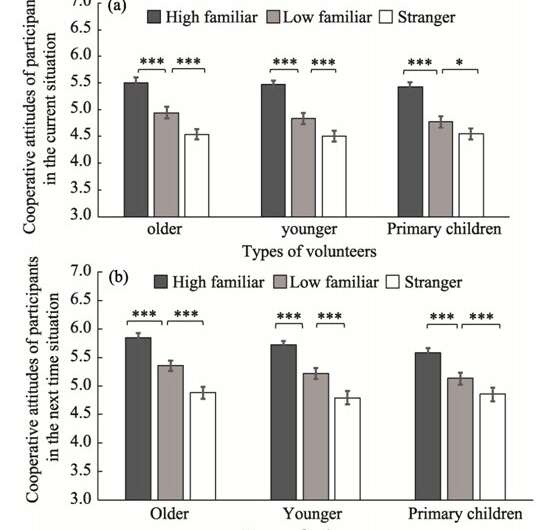This article has been reviewed according to Science X's editorial process and policies. Editors have highlighted the following attributes while ensuring the content's credibility:
fact-checked
trusted source
proofread
Study finds familiarity promotes resident cooperation with volunteers in waste separation

Imagine when you take out leftover food and throw it away, and a volunteer in front of the bucket tells you to separate the waste. If you have two options, one is to do it by yourself, and the other is not to sort the waste or even to give it to the volunteer for sorting. If the volunteer were a stranger, which one would you choose? If the volunteer were a friend, which one would you choose?
Although the increasing amount of waste threatens human well-being and the environment, participation rates in waste separation and recycling remain low without volunteer supervision. In the absence of improved laws and regulations, residents are reluctant to cooperate with volunteers in waste separation. The study focused on a key question that urgently needs to be addressed for effective waste separation. What types of volunteers (familiar or unfamiliar; elderly, young adults, or children) are more effective in promoting cooperation between residents and volunteers?
In view of this, Drs. Liu Pingping and Zhang Xuan led by Han Buxin from the Institute of Psychology of the Chinese Academy of Sciences (CAS) have investigated the effects of familiarity and age on residents' cooperation, as well as the mediating roles of reputation concern and social distance. The study, titled "Familiarity Promotes Resident Cooperation with Volunteers in Waste Separation" was published in Acta Psychologica Sinica on May 12.
They found that familiarity strongly promotes cooperation. People cooperate more with the high-familiarity volunteers than with the low-familiarity or unfamiliar volunteers. When age and familiarity interacted to influence the cooperative intentions, participants cooperated more with older volunteers in the low-familiarity condition.
When social distance and reputation concern were simultaneously treated as mediators in the multiple mediation models, the indirect effect of social distance and reputation concern was significant. Social distance and reputational concern play a serial mediating role in the effect of familiarity on cooperation.
The researchers suggest a causal relationship between familiarity with volunteers and residents' cooperation in the field of waste separation.
The results show that helping residents to become familiar with volunteers beforehand, or recruiting people who are familiar with residents as volunteers, could promote waste separation and help residents form this habit. Social distance and reputation concerns play serial mediating roles in the effect of familiarity on cooperation.
This study provides suggestions and scientific support for the practice of waste separation and saving management costs.
More information: Xuan Zhang et al, Familiarity promotes resident cooperation with volunteers in waste separation, Acta Psychologica Sinica (2023). DOI: 10.3724/SP.J.1041.2023.01358
Provided by Chinese Academy of Sciences




















